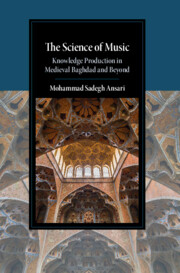Book contents
- The Science of Music
- Cambridge Studies in Islamic Civilization
- The Science of Music
- Copyright page
- Contents
- Acknowledgments
- Note on Transliteration
- Introduction
- Part I Context
- Part II Texts
- 5 Note, Sharpness, and Heaviness
- 6 Ratio and Interval
- 7 Consonance and Dissonance
- Epilogue
- Book part
- Bibliography
- Index
- Series page
6 - Ratio and Interval
from Part II - Texts
Published online by Cambridge University Press: 19 December 2024
- The Science of Music
- Cambridge Studies in Islamic Civilization
- The Science of Music
- Copyright page
- Contents
- Acknowledgments
- Note on Transliteration
- Introduction
- Part I Context
- Part II Texts
- 5 Note, Sharpness, and Heaviness
- 6 Ratio and Interval
- 7 Consonance and Dissonance
- Epilogue
- Book part
- Bibliography
- Index
- Series page
Summary
Chapter 6 discusses the definitions of ratios and intervals as different ways of conceptualizing the relationship between musical notes. Here, the author’s main interest lies in the two different ways in which the ancient Greek scholars of music, the Pythagoreans and the Aristoxenians, conceptualized the relationship between any given two notes. While the former understood notes as equal to numbers and thus conceptualized the relationship in the form of a numerical ratio, the latter understood them as points on a continuum and thus perceived the relationship as a geometrical distance between the two points on a scale. A third group of Greek scholars, the later Neoplatonic scholars, tried to reconcile the two approaches into a synthesis. It was this synthesis that Islamic scholars inherited during the medieval period.
Information
- Type
- Chapter
- Information
- The Science of MusicKnowledge Production in Medieval Baghdad and Beyond, pp. 145 - 160Publisher: Cambridge University PressPrint publication year: 2025
